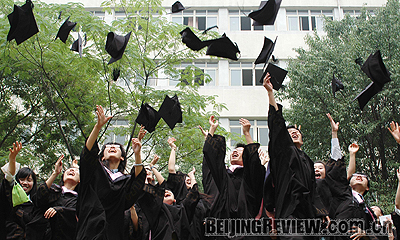|

END OF AN ERA: Students of Beijing Foreign Studies University, dressed in bachelor's gowns, celebrate their graduation by throwing their caps in the air
Translation Education
Translation education and theoretical research are active areas in China, bringing about breakthroughs in the development of translation as an academic discipline. During 2005 and 2006, China's translation education system was gradually established and improved. With approval from the Ministry of Education, Shanghai International Studies University set up an independent translation degree program in 2005, and started to enroll master's and Ph.D candidates of translation. In 2006, Guangdong University of Foreign Studies was approved to set up independent doctoral and master's degree programs in translation. In March 2006, the Ministry of Education gave permission to universities to set up bachelor's degree programs in translation. As part of the pilot program, Guangdong University of Foreign Studies, Fudan University and Hebei Normal University started to enroll undergraduate students of translation. By then, the educational system for translation was complete with bachelor's, master's and doctoral degrees. In some sense, this marked a milestone in translation education. In the meantime, almost all the Ph.D degree programs in foreign language studies began to enroll students majoring in translation. Hence, translation became the fastest growing major among foreign language study programs. Moreover, by the end of 2006, the Office of Academic Degrees of the State Council set up the Master of Translation and Interpreting (MTI) Experts Commission and officially launched a pilot master of translation and interpreting program in 2007.
With the rapid development of translation research and education, schools of translation and translation research institutes have sprouted at many universities. Schools of translation first appeared at Beijing University of Foreign Studies, Shanghai International Studies University and the Weihai campus of Shandong University, and in 2005, Xi'an International Studies University, Zhongshan University and Guangdong University of Foreign Studies. In 2006, a school of translation was set up at Sichuan University and Beijing International Studies University. In addition, many universities have set up translation departments. Research institutes for translations have been set up at Peking University, Guangdong University of Foreign Studies and Zhongshan University. In September 2005, the Translators Association of China (TAC) set up two national translation research document centers at the English Department of the Foreign Affairs University and the Advanced School of Translation at Guangdong University of Foreign Studies.
|
